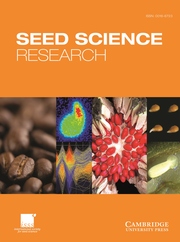No CrossRef data available.
Article contents
1-aminocyclopropane-1-carboxylate oxidase from embryonic axes of germinating chick-pea (Cicer arietinum L.) seeds: cellular immunolocalization and alterations in its expression by indole-3-acetic acid, abscisic acid and spermine
Published online by Cambridge University Press: 22 February 2007
Abstract
A recombinant protein (approximately 38 kDa by SDS/PAGE), induced by expression in Escherichia coli of a cDNA encoding a 1-aminocyclopropane-1-carboxylate oxidase (ACO) isolated from embryonic axes of Cicer arietinum, was recognized by an antibody raised against an apple ACO. A monoclonal antibody, obtained from recombinant ACO of chick-peas, was used for immunolocalization experiments in the embryonic axes of chick-pea seeds. The results indicate that most of the ACO was present in the apoplast of the cell wall. No evidence of this protein in the vacuole was detected. During germination of C. arietinum seeds, the production of ethylene was induced in the embryonic axis; its highest value was reached when radicle emergence occurred. At this moment there was an accumulation of 1-aminocyclopropane-1-carboxylate (ACC), transcription of ACO mRNA, as well as maximal ACO activity. In the post-germinative period the activity of the last step of ethylene biosynthesis decreased. This decrease was eliminated by indole-3-acetic acid (IAA), which caused significant transcription of ACO mRNA. It is suggested that gene expression of ACO may be induced by auxins and spermine (Spm) and inhibited by abscisic acid (ABA).
Keywords
- Type
- Research Article
- Information
- Copyright
- Copyright © Cambridge University Press 2001


